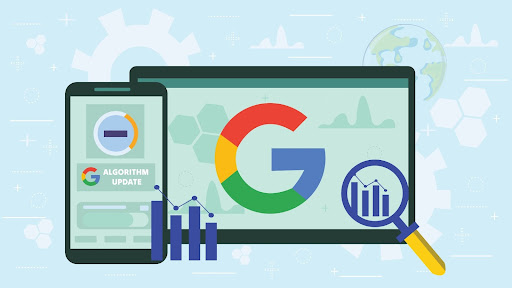Remain Ahead of the Contour: SEO Tips for Google's Algorithm Updates
Remain Ahead of the Contour: SEO Tips for Google's Algorithm Updates
Blog Article
Understanding the Implications of Google's Algorithm Updates on SEO Methods and Positions
In the ever-evolving landscape of search engine optimization (SEO), the implications of Google's formula updates have come to be a prime focus for marketing experts and services intending to preserve or enhance their on-line presence (Google’s Algorithm Updates). As Google proceeds to refine its formulas to provide customers with the most top quality and pertinent search results, recognizing how these updates influence SEO strategies and rankings is extremely important. From the subtle changes in keyword techniques to the extra obvious focus on user experience, the interplay between algorithm updates and SEO techniques introduces a complicated web of factors to consider that demand consistent watchfulness and adaptability
Advancement of Google's Formula

The Panda update, introduced in 2011, targeted low-quality content and punished web sites with duplicate, thin, or irrelevant material. Penguin, launched a year later, attended to link spam by devaluing manipulative links. Hummingbird, presented in 2013, marked a change in the direction of semantic search, comprehending the context and intent behind user queries as opposed to just matching search phrases.
These updates forced website proprietors and search engine optimization professionals to prioritize individual experience, quality content, and all-natural web link building methods to boost their rankings in Google's search results. The evolution of Google's formula emphasizes the internet search engine's dedication to providing important and pertinent web content to individuals while punishing methods intended solely at gaming the system.
Influence on Keyword Approach
With the development of Google's formula towards prioritizing individual experience and web content relevance, the Effect on Key words Strategy has come to be increasingly critical for site proprietors and SEO experts seeking to align with these online search engine updates. Key words are no more nearly matching search terms however recognizing customer intent and delivering valuable web content. Google's updates, such as BERT and RankBrain, concentrate on all-natural language processing and context, making keyword technique a lot more innovative.

Additionally, with Google's emphasis on semantic search and user-focused content, keyword phrase padding is no more effective and can also hurt rankings. Instead, including key phrases naturally right into high-grade, pertinent material is vital. By understanding the effect of Google's formula updates on key words technique, internet site proprietors can improve their SEO efforts and enhance their visibility in search engine result.
Changes in Material Optimization
As the landscape of seo remains to advance, website owners and SEO experts are seeing considerable changes in material optimization techniques. In the wake of Google's algorithm updates, there has been an expanding focus on creating high-grade, pertinent, and reliable material that offers worth to users. This suggests that just stuffing keywords right into articles is no longer reliable; rather, material should be well-written, engaging, and customized to satisfy the demands of the target market.
Furthermore, there is a greater emphasis on individual experience and satisfaction, redirected here with search engines gratifying web sites that offer a smooth surfing experience and important details. As an outcome, web content optimization now entails not only including appropriate search phrases normally but additionally structuring material in a way that is very easy to review and browse.
Relevance of User Experience
Enhancing customer experience on an internet site is extremely important in modern-day search engine optimization methods, acting as an essential consider establishing a site's exposure and success in search engine positions. Customer experience incorporates numerous aspects such as website rate, mobile-friendliness, instinctive navigation, and appealing material (Google’s Algorithm Updates). Google's algorithms significantly prioritize internet sites that provide a smooth and gratifying customer experience, as it straight correlates with individual satisfaction and retention
A positive individual experience not just enhances a site's SEO performance however additionally adds to greater conversion prices and consumer commitment. Sites that are very easy to navigate, visually appealing, and give valuable content are most likely to bring in and keep site visitors. On the other hand, web sites with poor user experience metrics may experience high bounce prices and low dwell times, signaling to online search engine that the material may not be pertinent or appealing for individuals.
For that reason, buying maximizing individual experience is essential for preserving an affordable edge in the ever-evolving digital landscape. By prioritizing user-centric design and capability, internet sites can boost their internet search engine rankings and inevitably drive more natural traffic and conversions.
Approaches for Future Adaptation
Moving on in the swiftly developing landscape of search engine optimization, it is critical for services to adopt cutting-edge strategies for future adaptation. One crucial strategy is to concentrate on creating high-quality, relevant web content that provides value to individuals. This web content should be enhanced for key words that line up with customer intent useful content and ought to be on a regular basis upgraded to stay affordable and existing.
Additionally, businesses need to prioritize mobile optimization to cater to the raising number of customers accessing the web via mobile phones. Making certain that sites lots rapidly, are easy to navigate, and provide a smooth customer experience on mobile devices can aid boost search positions and individual contentment.
In addition, leveraging information analytics and customer behavior understandings can aid companies comprehend their target audience far better and customize their SEO methods as necessary. By checking key performance indications and readjusting strategies based upon data-driven understandings, organizations can stay ahead of the contour and adjust to the ever-changing SEO landscape. Embracing arising technologies, such as voice search optimization and man-made knowledge, can likewise be advantageous for future-proofing SEO strategies.
Verdict

With the development of Google's algorithm towards prioritizing customer experience and material significance, the Effect on Keyword phrase Method has actually come to be significantly critical for internet site proprietors and SEO professionals seeking to straighten with these search engine updates. Google’s Algorithm Updates. Key words are no much longer simply concerning matching search terms however understanding customer intent and supplying important content. Google's formulas progressively prioritize internet sites that use a seamless and enjoyable user experience, as it straight correlates with his response customer contentment and retention
In contrast, internet sites with bad user experience metrics might suffer from high bounce prices and low dwell times, signifying to search engines that the content may not be pertinent or interesting for users.
The development of the algorithm has changed focus in the direction of user experience and high quality content, affecting keyword approach and web content optimization.
Report this page